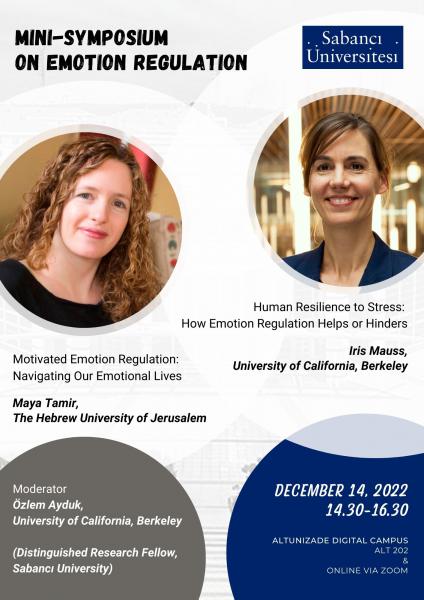Mini Symposium on Emotion Regulation
Mini-Symposium on Emotion Regulation
Please join the Sabanci University Faculty of Arts and Social Sciences for our mini-symposium on emotion regulation.
Time: Wednesday, December 14, 2022, 2:30 pm - 4:30 pm Istanbul time
(The speakers will be in the venue to answer questions and chat till around 5:00 pm.)
Place: Sabanci Digital Campus, Altunizade, Istanbul (Room ALT 202) or Online (Zoom Webinar)
Speakers:
Maya Tamir, Professor of Psychology at the Hebrew University of Jerusalem
Title: "Motivated Emotion Regulation: Navigating Our Emotional Lives"
Iris Mauss, Professor of Psychology at the University of California, Berkeley
Title: "Human Resilience to Stress: How Emotion Regulation Helps or Hinders"
Moderator:
Ozlem Ayduk, Professor of Psychology at the University of California, Berkeley and Distinguished Fellow at Sabanci University
The event is open to the public free of charge. You may register by following this link. https://sabancimanagement.qualtrics.com/jfe/form/SV_cLJXwC6W1LpRGSO
Abstracts and speaker bios may be found below.
Speaker: Maya Tamir, PhD
Title: Motivated Emotion Regulation: Navigating Our Emotional Lives
Abstract:
Emotion regulation is important for psychological well-being, yet we know relatively little about why, when, and how hard people try to regulate emotions. In this talk, I consider effortful emotion regulation as a unique form of cybernetic control and derive several hypotheses from this approach. First, I suggest that what people want to feel varies and drives emotion regulation. Second, I hypothesize that discrepancies between actual and desired emotions inform the process and outcomes of emotion regulation. Finally, I propose that success in emotion regulation depends on both the content and the strength of motivation. I share empirical data that speak to these hypotheses, discuss their potential implications, and highlight open questions that await future research.
Short Bio:
Maya Tamir is a professor of psychology and the director of the Emotion and Self-Regulation Laboratory at the Hebrew University of Jerusalem in Israel. She completed her PhD at the University of Illinois at Urbana-Champaign, and her postdoctoral training at Stanford University. Her research focuses on the motivational underpinnings of emotion regulation and their implications for social functioning and psychological health. Prof. Tamir’s research has been funded by the National Science Foundation, the Israeli Science Foundation, The European Union, and the German-Israeli Foundation. She has published over 100 scientific papers in top journals and has received multiple awards. She currently serves as the elected president of the international Society for Affective Science.
Speaker: Iris Mauss, PhD
Title: Human Resilience to Stress: How Emotion Regulation Helps or Hinders
Abstract:
Stress – the experience of adverse life events and circumstances – is one of the most robust contributors to psychological and other health problems. Crucially, however, the deleterious effects of stress are not observed in all people exposed to stress. Many people exhibit resilience: They maintain health and well-being even under conditions of elevated stress. Given that negative emotions such as sadness, anger, and anxiety lie at the heart of what makes stressors stressful, individuals’ ability to regulate these negative emotions should be a pivotal resilience factor. In this talk, I will present research that examines how people can successfully regulate their emotions, via what pathways emotion regulation contributes to resilience, and when emotion regulation might hurt rather than help.
Short bio:
Iris Mauss received her PhD in psychology from Stanford University. She is a professor of psychology and the director of the Emotion and Emotion Regulation Laboratory at the University of California, Berkeley. Her research focuses on emotions and emotion regulation, with an emphasis on their role in health and well-being. Her research has been funded by the National Institutes of Health, The National Science Foundation, and the John Templeton Foundation. For her teaching and research, she has received multiple awards, including the American Psychological Association’s Distinguished Scientific Award for an Early Career Contribution to Psychology in the area of Social Psychology and the Society of Social and Personality Psychology’s Ed Diener mid-career award.
